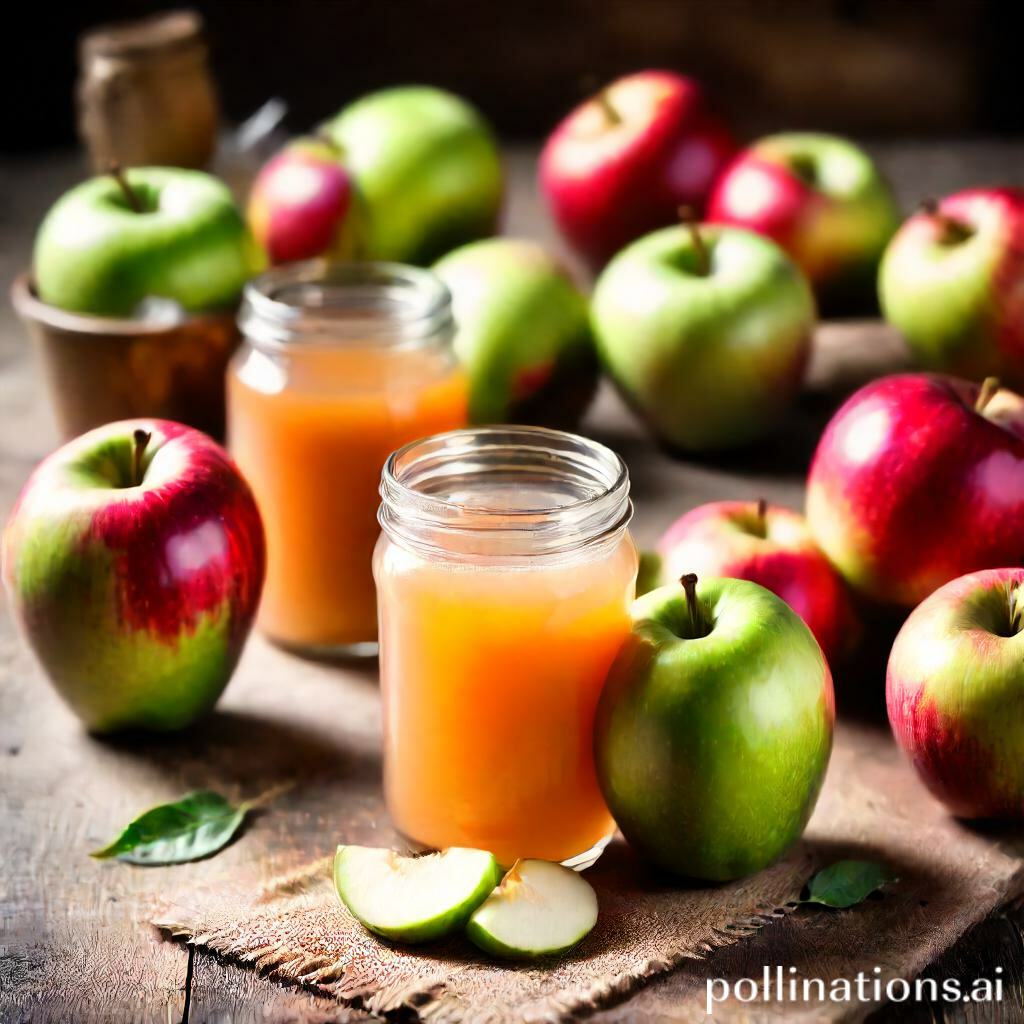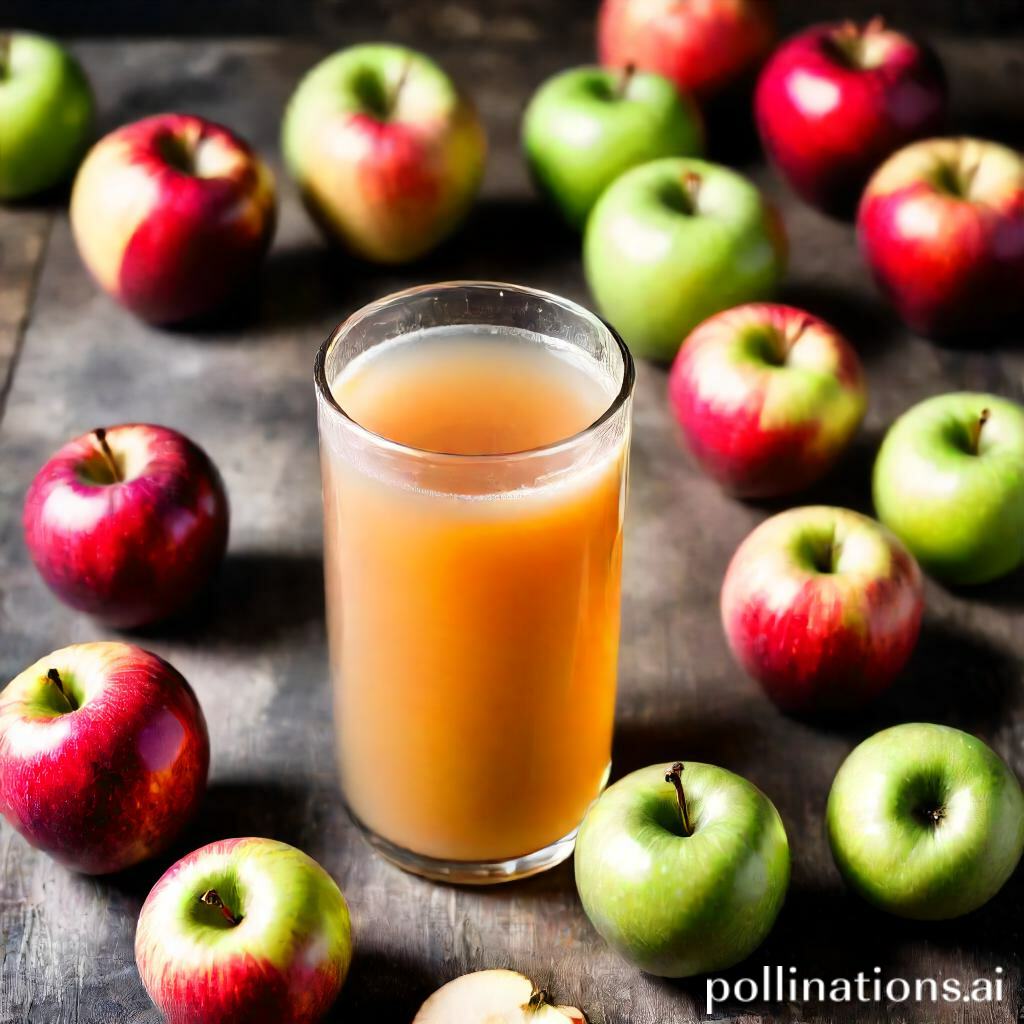If you’ve accidentally consumed fermented apple juice, it’s important to understand the potential effects on your body. Fermentation turns sugars into alcohol, so you may have ingested some alcohol along with probiotics, which can impact digestion.
In the course of moderate consumption of fermented foods can be beneficial, unintentional intake of alcohol, especially if unexpected or in larger quantities, may pose health risks. It’s crucial to monitor your body’s response and seek medical advice if you experience any adverse symptoms.
This overview will guide you through the implications and appropriate steps to take following the ingestion of fermented apple juice.
The Process of Fermentation
Fermentation is a fascinating biological process that occurs in various foods and beverages, including apple juice. Comprehending how fermentation works can provide valuable insights into the production of different fermented products.
1. Mastering the Fermentation Process
Fermentation is a metabolic process in which microorganisms, such as yeast or bacteria, convert sugars into alcohol, acids, or gases. This transformation occurs in the absence of oxygen, making it an anaerobic process. The microorganisms break down the sugars through enzymatic reactions, producing energy and byproducts.
During fermentation, yeast or bacteria consume the sugars present in the apple juice and convert them into alcohol, primarily ethanol. This process is what gives fermented apple juice, also known as hard cider, its distinctive flavor and alcoholic content.
2. Factors that Contribute to Fermentation
Several factors influence the fermentation process, ensuring optimal results and desired outcomes. These factors include:
- Temperature: Fermentation occurs within a specific temperature range, depending on the type of microorganism involved. Yeast, for example, thrives in temperatures between 60°F and 75°F.
- Time: The duration of fermentation affects the flavor, aroma, and alcohol content of the final product. Longer fermentation periods generally result in a more complex and robust flavor profile.
- Microorganisms: Different strains of yeast or bacteria can produce distinct flavors and characteristics during fermentation. Choosing the right strain is crucial in achieving the desired outcome.
- Nutrients: Microorganisms require certain nutrients, such as nitrogen and vitamins, to facilitate the fermentation process effectively. These nutrients can be naturally present in the apple juice or added externally.
3. How Apple Juice Becomes Fermented
The process of turning apple juice into fermented cider involves several steps:
- Selection of Apples: High-quality apples with the right balance of acidity and sugar content are carefully chosen for juicing.
- Juicing: The selected apples are washed, crushed, and pressed to extract the juice.
- Addition of Yeast: The apple juice is then inoculated with a specific strain of yeast that is suitable for cider production.
- Fermentation: The inoculated apple juice is left to ferment in a controlled environment for a specific period, allowing the yeast to convert the sugars into alcohol.
- Clarification and Aging: After fermentation, the cider is clarified by allowing the sediments to settle, and it may be aged in barrels or tanks to develop further flavors and aromas.
The result of this process is a delicious and refreshing fermented apple juice, perfect for enjoying on its own or as a base for cocktails and culinary creations. Whether you prefer a crisp and dry cider or a sweeter and more fruity variation, the fermentation process plays a crucial role in creating the flavors we love.
| Factors | Temperature Range |
|---|---|
| Yeast | 60°F – 75°F |

Signs and Symptoms of Drinking Fermented Apple Juice
Drinking fermented apple juice can have various signs and symptoms that indicate its consumption. Indispensable to be aware of these signs to ensure the safety and well-being of individuals.
1. Recognizing the Taste and Smell of Fermented Juice
One of the key indicators of fermented apple juice is its distinct taste and smell. When apple juice ferments, it undergoes a natural process where sugars are converted into alcohol. This results in a tangy and slightly sour taste, accompanied by a distinct yeasty aroma.
2. Common Reactions to Consuming Fermented Apple Juice
Consuming fermented apple juice can lead to various reactions in individuals. Some common reactions include:
- Feeling lightheaded or dizzy
- Experiencing a warm sensation in the body
- Changes in coordination and motor skills
- Flushed skin or redness
- Nausea or upset stomach
3. Health Risks Associated with Drinking Fermented Beverages
At the same time fermented apple juice may be enjoyed by some, pivotal to be aware of the potential health risks associated with its consumption. These risks include:
- Alcohol intoxication: Consuming large amounts of fermented apple juice can lead to alcohol intoxication, which can impair judgment and coordination.
- Allergic reactions: Some individuals may have allergies to certain components of fermented beverages, leading to allergic reactions such as hives, itching, or difficulty breathing.
- Impaired liver function: Excessive consumption of fermented beverages over time can put strain on the liver and potentially lead to liver damage.
Pivotal to consume fermented apple juice in moderation and be mindful of its effects on the body. If any unusual symptoms or reactions occur after consumption, it is recommended to seek medical attention.
Prevention and Handling of Fermented Apple Juice
Fermented apple juice can pose health risks if not properly handled and consumed. Indispensable to follow proper storage and handling techniques to ensure the safety of the product. In this section, we will discuss some key tips and guidelines to prevent accidental consumption of fermented juice and how to check expiration dates and labels for your safety.
1. Proper Storage and Handling Techniques
When storing fermented apple juice, it is crucial to keep it in a cool and dark place to prevent further fermentation. The ideal temperature for storage is between 35°F and 45°F. Make sure to seal the container tightly to avoid any exposure to air, which can accelerate the fermentation process. Additionally, storing the juice away from other food items can prevent cross-contamination.
When handling fermented juice, always use clean and sanitized utensils and containers. Avoid using your hands directly to prevent the introduction of bacteria. It is recommended to use glass or stainless steel containers, as they are easier to clean and maintain hygiene standards.
2. How to Prevent Accidental Consumption of Fermented Juice
To prevent accidental consumption of fermented apple juice, it is essential to educate yourself and others about the signs of fermentation. Fermented juice often develops carbonation and a tangy, alcoholic taste. If you notice any changes in the smell, taste, or texture of the juice, it is best to discard it to avoid any health risks.
It is also important to properly label the containers to avoid confusion. Clearly mark the date of preparation and expiration on the label. This will help you keep track of the freshness of the juice and ensure that it is consumed within the recommended time frame.
3. Checking Expiration Dates and Labels
When purchasing fermented apple juice, always check the expiration dates and labels. Look for any signs of tampering or damage to the packaging. Ensure that the label includes important information such as the date of production, ingredients, and any specific storage instructions.
Expired or damaged products should never be consumed, as they may contain harmful bacteria or toxins. If you have any doubts about the quality or safety of the juice, it is best to consult with the manufacturer or a health professional.

What to do if you accidentally drink fermented apple juice
1. Immediate actions to take
If you accidentally drink fermented apple juice, indispensable to take immediate actions to minimize any potential harm. Here are some steps you can take:
- Stop drinking: If you realize that the apple juice you consumed is fermented, stop drinking it immediately.
- Rinse your mouth: Rinse your mouth with clean water to remove any residue.
- Drink water: Drink plenty of water to help dilute the effects of the fermented juice.
- Induce vomiting: If you have ingested a large amount of fermented apple juice, consider inducing vomiting to remove it from your system. Albeit, consult a medical professional before doing so.
2. Seeking medical attention if necessary
In some cases, consuming fermented apple juice may lead to adverse effects that require medical attention. If you experience any of the following symptoms, indispensable to seek medical help:
- Severe nausea or vomiting: If you are unable to stop vomiting or experience persistent nausea, consult a doctor.
- Abdominal pain or cramps: If you develop severe abdominal pain or cramps, it is advisable to seek medical attention.
- Signs of dehydration: If you become dehydrated, characterized by excessive thirst, dry mouth, and decreased urination, medical help should be sought immediately.
3. Potential side effects and remedies
Consuming fermented apple juice may lead to certain side effects. Here are some common side effects and remedies:
| Side Effect | Remedy |
|---|---|
| Digestive discomfort: | Drink ginger tea or take over-the-counter antacids to ease digestive discomfort. |
| Headache: | Take a pain reliever such as ibuprofen or acetaminophen to alleviate headache symptoms. |
| Dizziness: | Rest and drink plenty of fluids to help alleviate dizziness caused by consuming fermented apple juice. |

Alternative uses for fermented apple juice
Fermented apple juice, also known as cider, has a wide range of alternative uses beyond being a refreshing beverage. From culinary applications to creative recipes, there are numerous ways to incorporate this tangy and flavorful liquid into your daily life.
1. Culinary applications of fermented juice
Fermented apple juice can be used as a versatile ingredient in various culinary dishes. Its unique taste adds depth and complexity to both sweet and savory recipes. Some popular culinary uses of fermented juice include:
- Marinades and glazes for meats and poultry
- Sauces and dressings for salads and desserts
- Enhancing the flavor of soups, stews, and gravies
2. Creative recipes enmeshing fermented apple juice
Get creative in the kitchen with these unique recipes that make use of fermented apple juice:
- Apple cider caramel sauce: Drizzle this rich and luscious sauce over ice cream, pancakes, or apple pie for a decadent treat.
- Cider-infused roasted vegetables: Add a splash of fermented juice to your roasted vegetable medley for an extra burst of flavor.
- Apple cider smoothie: Blend fermented juice with your favorite fruits and yogurt for a refreshing and nutritious smoothie.
3. Benefits of using fermented juice in cooking
Using fermented apple juice in your cooking offers several benefits:
- Enhanced flavor profile: The tangy and slightly acidic taste of fermented juice adds complexity to dishes, elevating their overall taste.
- Nutritional value: Fermented apple juice retains many of the nutrients from fresh apples, making it a healthy addition to your meals.
- Increased moisture and tenderness: When used as a marinade or glaze, fermented juice helps to tenderize meats and adds moisture to prevent drying out.
For more information and interesting facts about fermented apple juice, refer to the table below:
| Fact | Description |
|---|---|
| Fact 1: | Apple cider is typically made from a blend of different apple varieties for a balanced and unique flavor. |
| Fact 2: | Fermentation of apple juice is a natural process that converts the sugars in the juice into alcohol. |
| Fact 3: | Apple cider vinegar, a byproduct of fermentation, is known for its various health benefits and culinary uses. |
Faq about Fermented Apple Juice
FAQ 1: Can drinking fermented apple juice make you sick?
Drinking fermented apple juice can potentially make you sick. Fermentation involves the conversion of sugars into alcohol by yeast or bacteria. If the fermentation process is not controlled properly, harmful bacteria can grow, leading to foodborne illnesses.
FAQ 2: How long does it take for apple juice to ferment?
The duration of apple juice fermentation depends on various factors, including temperature, sugar content, and the type of yeast or bacteria used. On average, it takes around 1-2 weeks for apple juice to fully ferment.
FAQ 3: What are the potential health benefits of fermented apple juice?
Fermented apple juice, also known as hard cider, can offer some health benefits. It contains antioxidants, vitamins, and minerals present in apples. Moderate consumption may support heart health, improve digestion, and provide a source of probiotics.
FAQ 4: Can you still use fermented apple juice for cooking?
Yes, fermented apple juice can still be used for cooking. Despite this, pivotal to note that the alcohol content in fermented apple juice may not completely evaporate during cooking, so it is advisable to consider the alcohol content when preparing dishes for individuals who should avoid alcohol.
FAQ 5: How can I prevent accidental consumption of fermented beverages?
To prevent accidental consumption of fermented beverages, it is essential to properly label and store them separately from non-alcoholic beverages. Clear labeling and education about the contents of the beverages can help individuals make informed choices and avoid any unintended consumption.
Bottom Line
Accidentally drinking fermented apple juice can lead to unexpected consequences. The natural sugars in the juice can ferment over time, resulting in a fizzy and alcoholic beverage. At the same time it may be a surprising and unintended experience, pivotal to be cautious when consuming any unfamiliar liquids. Always double-check the expiration date and storage conditions of beverages to prevent any mishaps. Remember, what may seem like a harmless drink can turn into an unexpected adventure!

